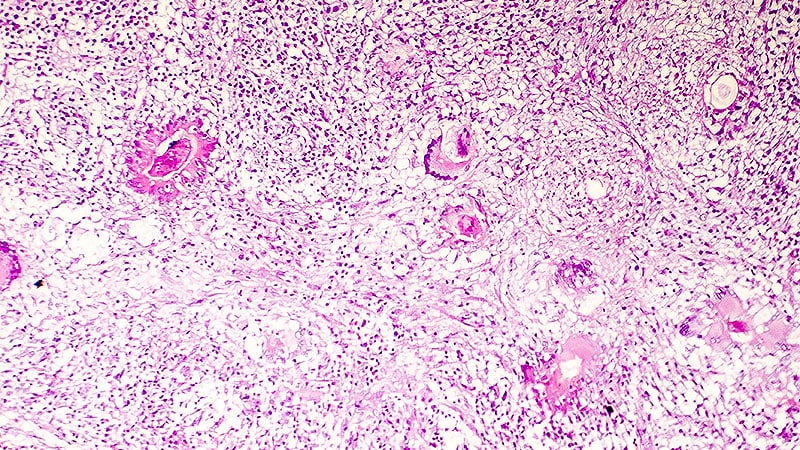Patients With Post-COVID Cognitive Symptoms May Have Gliosis
Core Concepts
Patients with post-COVID cognitive symptoms may exhibit gliosis and inflammation, indicating potential underlying brain changes.
Abstract
The content discusses a study on patients with persistent depressive or cognitive symptoms after mild to moderate COVID-19, focusing on the presence of gliosis and inflammation in the brain. The study analyzed the levels of translocator protein total distribution volume (TSPO VT) in specific brain regions of patients with COVID-DC compared to control individuals. The findings suggest a potential link between gliosis in the ventral striatum and dorsal putamen and the reported symptoms. The study emphasizes the importance of understanding these brain changes for developing effective treatments for post-COVID cognitive symptoms.
Study on patients with post-COVID cognitive symptoms
Analysis of TSPO VT levels in specific brain regions
Potential association between gliosis and persistent symptoms
Importance of understanding brain changes for treatment development
Ongoing research on inflammation in the brain and treatment efficacy
Patients With Post-COVID Cognitive Symptoms May Have Gliosis
Stats
The level of translocator protein total distribution volume (TSPO VT) was 9.23 mL/cm3 among patients with COVID-DC and 7.72 mL/cm3 among control persons.
The difference in TSPO VT was most noticeable in the ventral striatum (mean difference, 1.97 mL/cm3) and dorsal putamen (mean difference, 1.70 mL/cm3).
Motor speed on the finger-tapping test was negatively associated with dorsal putamen TSPO VT (r, −0.53).
Quotes
"Most theories assume there is inflammation in the brain [with] long COVID," - Dr. Jeffrey Meyer
"Presently, clinicians can use treatments for symptoms in other illnesses that are [also] common with long COVID. We need better than this." - Dr. Jeffrey Meyer
"Follow-up large cohort studies including other measures of neuroimaging modalities assessing circuitry and neurochemistry are needed." - Dr. Vilma Gabbay
Key Insights Distilled From
by Marilynn Lar... at www.medscape.com 06-15-2023
https://www.medscape.com/viewarticle/993256
Deeper Inquiries
What are the potential implications of gliosis and inflammation in post-COVID cognitive symptoms for long-term brain health?
Gliosis and inflammation in post-COVID cognitive symptoms can have significant implications for long-term brain health. Gliosis, which is the reactive response of glial cells to damage in the central nervous system, and inflammation are indicative of ongoing neuroinflammatory processes. These processes can lead to structural and functional changes in the brain, potentially affecting cognitive function, mood regulation, and overall brain health. Chronic neuroinflammation has been associated with various neurodegenerative diseases and psychiatric disorders, highlighting the importance of understanding and addressing these processes in post-COVID cognitive symptoms to prevent long-term consequences on brain health.
How can the limitations of the study, such as the cross-sectional design, impact the interpretation of the results and treatment recommendations?
The limitations of the study, particularly its cross-sectional design, can impact the interpretation of the results and subsequent treatment recommendations. A cross-sectional study design provides a snapshot of data at a single point in time, limiting the ability to establish causal relationships or determine the temporal sequence of events. In the case of this study on post-COVID cognitive symptoms and gliosis, a cross-sectional design may not capture the dynamic nature of neuroinflammatory processes over time. This limitation can affect the generalizability of the findings and the ability to make definitive treatment recommendations based on the results. Longitudinal studies are needed to track changes in gliosis and inflammation over time and their relationship to cognitive symptoms, providing more robust evidence for treatment interventions.
How might advancements in neuroimaging modalities contribute to a deeper understanding of the brain changes associated with post-COVID cognitive symptoms?
Advancements in neuroimaging modalities play a crucial role in deepening our understanding of the brain changes associated with post-COVID cognitive symptoms. Techniques such as PET imaging with specific ligands, like TSPO, allow researchers to visualize and quantify neuroinflammatory processes, such as gliosis, in vivo. By identifying and mapping these changes in the brain, researchers can correlate them with cognitive symptoms and potentially uncover underlying mechanisms driving post-COVID cognitive impairment. Additionally, emerging neuroimaging modalities, such as functional MRI and diffusion tensor imaging, provide insights into brain connectivity, network alterations, and structural changes that may contribute to cognitive dysfunction in long COVID. Integrating these advanced imaging techniques with clinical assessments can offer a comprehensive understanding of the neurobiological underpinnings of post-COVID cognitive symptoms, guiding the development of targeted interventions and personalized treatment strategies.
0
